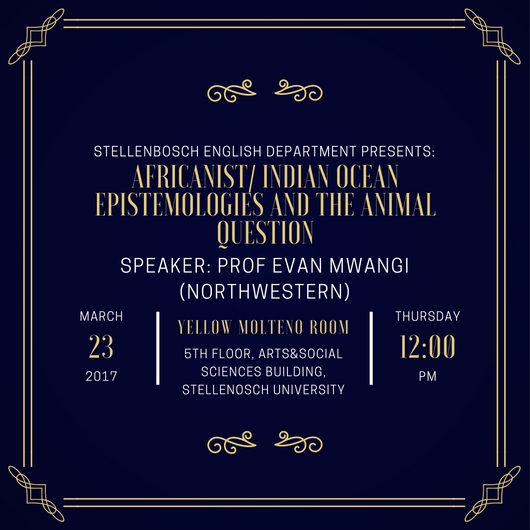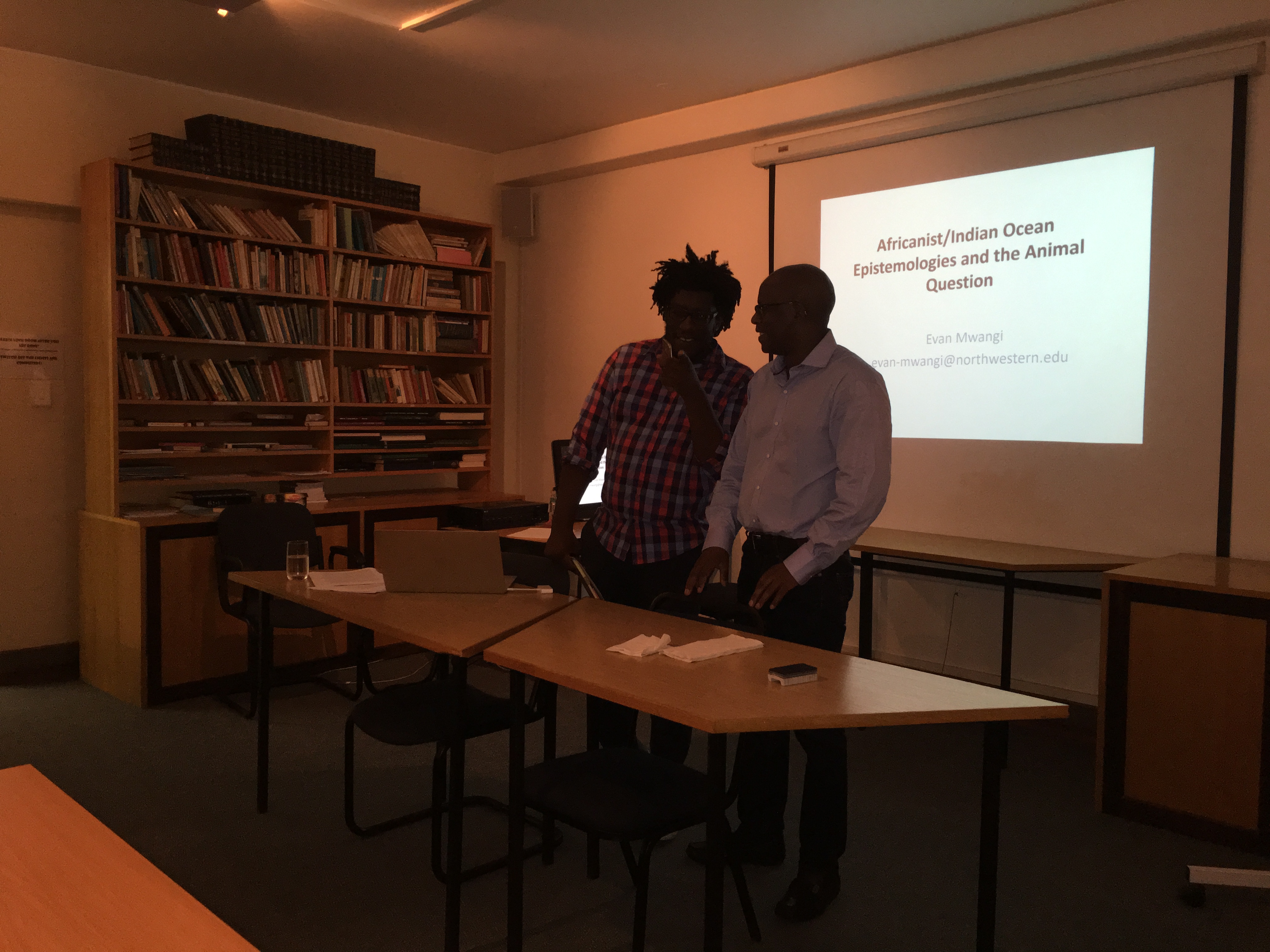Indian Ocean Epistemologies
This project has supported a cross-institutional collaboration between Professor Evan Mwangi of Northwestern University and Professor Tina Steiner of Stellenbosch University, to oversee the publication of a translation into English of Davidson Don Tengu Jabavu’s isiXhosa travelogue to India; and to co-edit a special issue of the journal Eastern African Literary and Cultural Studies on Indian Ocean epistemologies. The travelogue and the scholarly articles are academic resources for a new critical theory course on Indian Ocean epistemologies developed by Evan Mwangi and Tina Steiner. The collaboration also included a graduate student exchange through the award of a Mellon predoctoral fellowship to support the participation of a graduate fellow based in South Africa, to assist with the research for the course development during a visiting residency at Northwestern. The predoctoral fellowship was awarded to Serah Namulisa Kasembeli.
Faculty
 Tina Steiner is Associate Professor of English at Stellenbosch University in Stellenbosch, South Africa, where she teaches on African fiction, translation studies, postcolonial studies, migration studies, and Eastern Africa and the Indian Ocean. She is the author of Translated People, Translated Text: Language and Migration in Contemporary African Literature (2009), as well as articles and chapters on Leila Aboulela, Tsitsi Dangarembga, Abdulrazak Gurnah, Jamal Mahjoub, Sophia Mustafa, Ishtiyaq Shukri, and M.G. Vassanji. Her research and teaching focus on African and Asian literature, migration, and translation.
Tina Steiner is Associate Professor of English at Stellenbosch University in Stellenbosch, South Africa, where she teaches on African fiction, translation studies, postcolonial studies, migration studies, and Eastern Africa and the Indian Ocean. She is the author of Translated People, Translated Text: Language and Migration in Contemporary African Literature (2009), as well as articles and chapters on Leila Aboulela, Tsitsi Dangarembga, Abdulrazak Gurnah, Jamal Mahjoub, Sophia Mustafa, Ishtiyaq Shukri, and M.G. Vassanji. Her research and teaching focus on African and Asian literature, migration, and translation.
 Evan Mwangi is Professor of English and Comparative Literature at Northwestern University, where he also teaches in the Program of African Studies. He is the author of Africa Writes Back to Self: Metafiction, Gender, Sexuality (2009), Translation in African Contexts (SUNY Press, 2017), a study of gender and sexuality in translations of texts between African languages, and The Postcolonial Animal: African Literature and Posthuman Ethics (Michigan, 2019). He is also co-author of The Columbia Guide to East African Literature in English Since 1945 (Columbia University Press, 2007).
Evan Mwangi is Professor of English and Comparative Literature at Northwestern University, where he also teaches in the Program of African Studies. He is the author of Africa Writes Back to Self: Metafiction, Gender, Sexuality (2009), Translation in African Contexts (SUNY Press, 2017), a study of gender and sexuality in translations of texts between African languages, and The Postcolonial Animal: African Literature and Posthuman Ethics (Michigan, 2019). He is also co-author of The Columbia Guide to East African Literature in English Since 1945 (Columbia University Press, 2007).
He has published on postcolonial artists and intellectuals including Nazizi Hirji, Chinua Achebe, K. Sello Duiker, Amandina Lihamba, and Ngugi wa Thiong'o. Mwangi is currently at work on two new book projects: one exploring the global re-writings of Conrad’s Heart of Darkness and the other on Indian Ocean literatures and philosophies.
Visiting Predoctoral Fellow
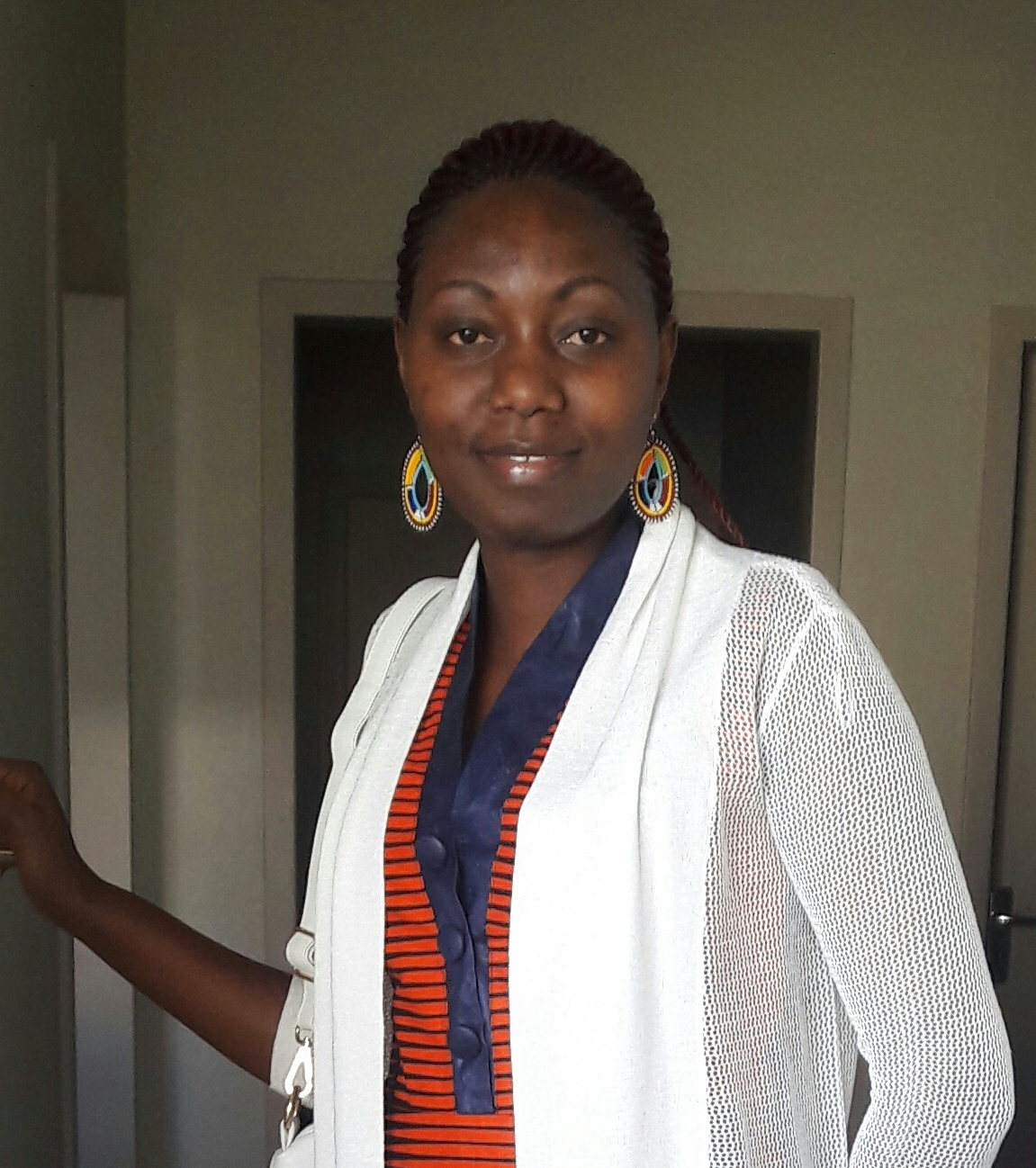 Kenyan researcher Serah Namulisa Kasembeli spent the Fall 2017 and Winter 2018 quarters at Northwestern as the first of this project’s Andrew W. Mellon International Predoctoral Fellows, while enrolled at Stellenbosch University (South Africa) as an English Studies PhD student. Specializing in Indian Ocean slavery, her dissertation The ghost of memory: literary representations of slavery in post-apartheid South Africa (2018) focuses on the haunting trope resultant from repressed slave historical pasts. She reads the concepts of the archive, memory, trauma and hauntology in post-apartheid literature as an embodiment of a silenced history of slavery in the post-apartheid nation. Her master’s thesis in Literature (University of Nairobi) raised awareness to the subjectivity of girls from a slum area in Nairobi to the access of secondary school education through the scripting of the play Water but Wine. She is also the author of Indian Ocean Ways of Being: The Afterlives of Slavery Across the Indian Ocean (2019), and On Indian Ocean Slavery and Historical Erasure (2019).
Kenyan researcher Serah Namulisa Kasembeli spent the Fall 2017 and Winter 2018 quarters at Northwestern as the first of this project’s Andrew W. Mellon International Predoctoral Fellows, while enrolled at Stellenbosch University (South Africa) as an English Studies PhD student. Specializing in Indian Ocean slavery, her dissertation The ghost of memory: literary representations of slavery in post-apartheid South Africa (2018) focuses on the haunting trope resultant from repressed slave historical pasts. She reads the concepts of the archive, memory, trauma and hauntology in post-apartheid literature as an embodiment of a silenced history of slavery in the post-apartheid nation. Her master’s thesis in Literature (University of Nairobi) raised awareness to the subjectivity of girls from a slum area in Nairobi to the access of secondary school education through the scripting of the play Water but Wine. She is also the author of Indian Ocean Ways of Being: The Afterlives of Slavery Across the Indian Ocean (2019), and On Indian Ocean Slavery and Historical Erasure (2019).
An article about Kasembeli's research is available here.
Project Syllabus
Indian Ocean Epistemologies - Background Reading
Adejunmobi, Moradewun. "Claiming the Field: Africa and the Space of Indian Ocean Literature." Callaloo 32, no. 4 (2009): 1247–1261.
Campbell, Gwyn. "Slavery and the Trans-Indian Ocean World Slave Trade: A Historical Outline." In Cross Currents and Community Networks: The History of the Indian Ocean World, edited by Himanshu Prabha Ray and Alpers Ray, 286–305. New Delhi: Oxford University Press, 2007.
Desai, Gaurav. "Oceans Connect: The Indian Ocean and African Identities." Pmla 125, no. 3 (2010): 713–720.
Green, Nile. "Africa in Indian Ink: Urdu Articulations of Indian Settlement in East Africa." The Journal of African History 53, no. 2 (2012): 131–150.
Gupta, Ashin Das. India and the Indian Ocean World: Trade and Politics. New Delhi: Oxford University Press, 2004.
Hawley, John C., ed. India in Africa, Africa in India: Indian Ocean Cosmopolitanisms. Bloomington, IN: Indiana University Press, 2008.
Hofmeyr, Isabel. "The Black Atlantic Meets the Indian Ocean: Forging New Paradigms of Transnationalism for the Global South – Literary and Cultural Perspectives." Social Dynamics 33, no. 2 (2007): 3–32.
McPherson, Kenneth. The Indian Ocean: A History of People and the Sea. New York: Oxford University Press, 1993.
Mwangi, Evan Maina. "Gendered Theoretical Recalibrations." In Africa Writes Back to Self: Metafiction, Gender, Sexuality, 235–254. Albany, NY: SUNY Press, 2009.
Pearson, Michael. The Indian Ocean. London: Routledge, 2007.
Ray, Prabha Himanshu and Alpers Ray, eds. Cross Currents and Community Networks: The History of the Indian Ocean World. New Delhi: Oxford University Press, 2007.
Sheriff, Abdul. Slaves, Spices, & Ivory in Zanzibar: Integration of an East African Commercial Empire into the World Economy, 1770-1873. Athens, OH: Ohio University Press, 1987.
Steiner, Tina. "Navigating Multilingually: The Chronotope of the Ship in Contemporary East African Fiction." English Studies in Africa 51, no. 2 (2008): 49–58.
———. Translated People, Translated Texts: Language and Migration in Contemporary African Literature. Manchester: St. Jerome Publishing, 2009.
———. "The Indian Ocean Travels of Sheik Yusuf and Imam Ali Ali: Literary Representations in Ishtiyaq Shukri's The Silent Minaret and Achmat Dangor's Bitter Fruit." Social Dynamics 38, no. 2 (2012): 172–183.
Vink, P.M. Markus. "Indian Ocean Studies and the 'New Thalassology'." Journal for Global History 2, no. 1 (2007): 41–62.
*This reading list was compiled by Serah Kasembeli.
Indian Ocean Epistemologies - Extended Resources
A list of projects, institutes, and initiatives concerned with the topic of Indian Ocean Epistemologies is available here.
News and Events
- March 2020 | Northwestern
On Friday, March 6, subproject participant Kritish Rajbhandari of Reed College returned to Northwestern's Evanston campus to present a talk entitled "Anarchival Drift and the Limits of Community in Indian Ocean Fiction."
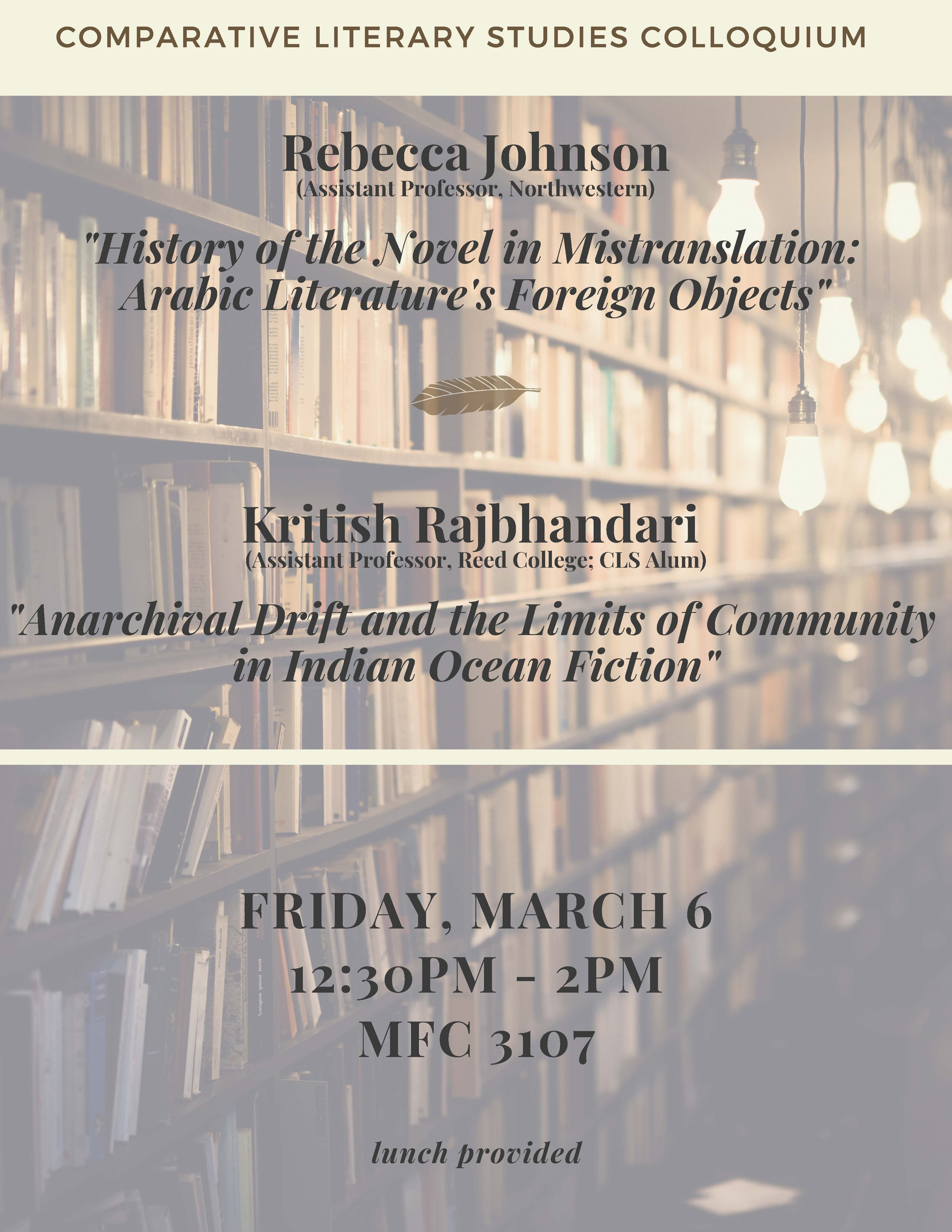
- February 2020
The project's English translation of D.D.T Jabavu's travelogue 'In India and East Africa' is now in publication, and distributed in the United States by NYU Press. Details can be found here. - January 2020
Former Mellon Predoctoral Fellow, Serah Kasembeli, recently published an article entitled "The South African Student #Fallist Movements" that builds upon work begun during her time at Northwestern. You can find the article here. - October 2019
We are delighted to announce that the new English translation of D.D.T Jabavu's travelogue, 'In India and East Africa,' will be published by Wits University Press in February 2020.
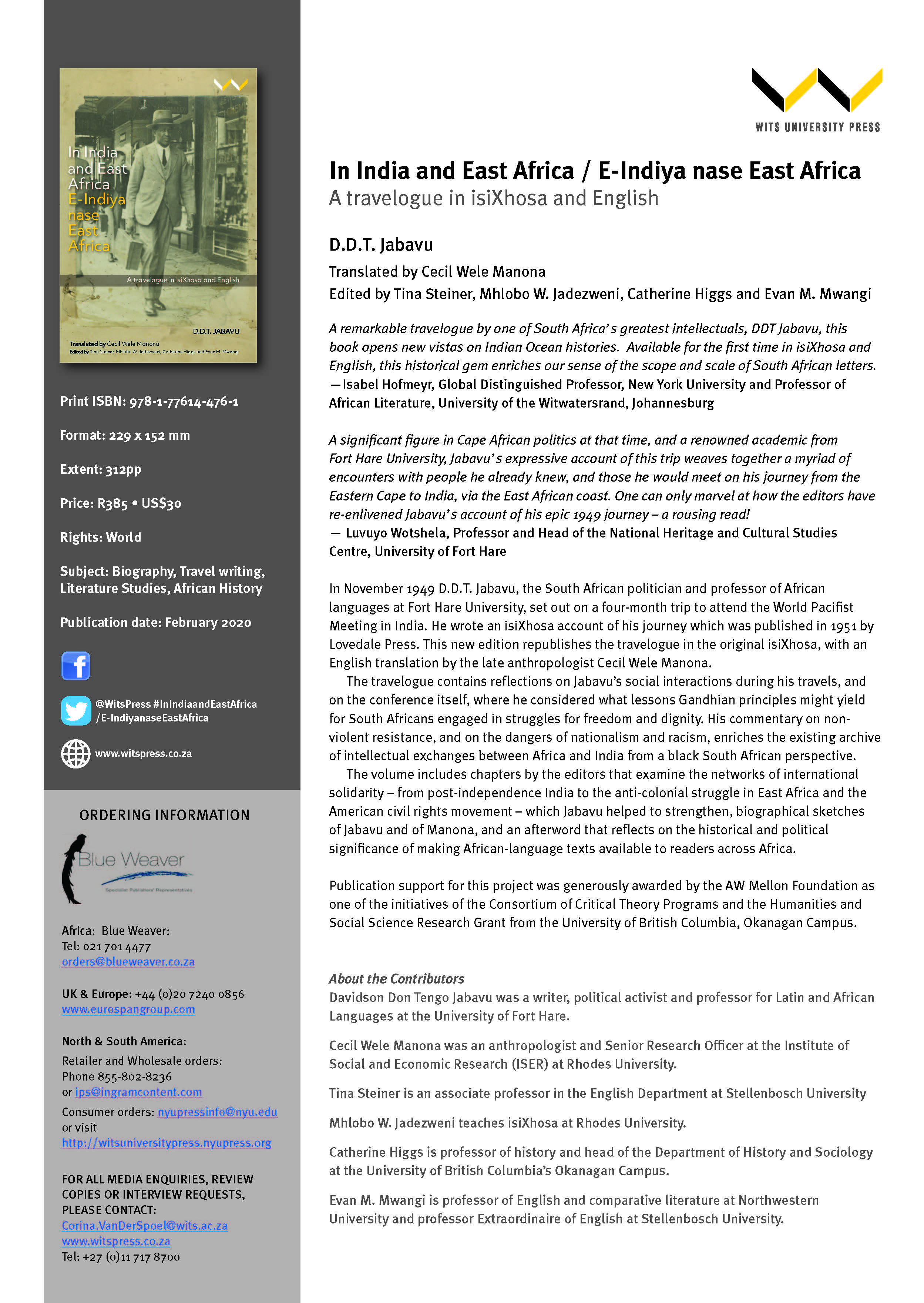
- October 2018
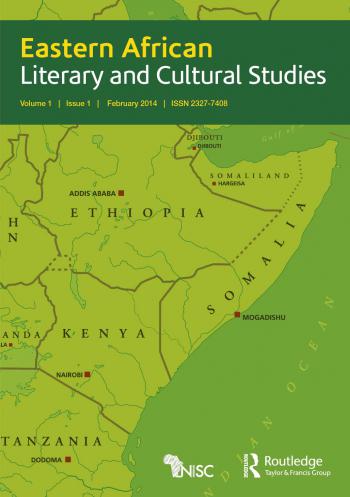
"Indian Ocean Trajectories," the special issue of the journal of Eastern African Literary and Cultural Studies co-edited by Professors Steiner and Mwangi, has been published and is available to read here. - June 12, 2018
Former Visiting Predoctoral Fellow Serah Kasembeli, having completed her doctorate, has published "The Ghosts of Slavery Still Haunt Us," an article in the newspaper Cape Times describing her doctoral research. Congratulations, Serah! - May 26–June 5, 2018 | Northwestern
Tina Steiner visited Northwestern to co-teach with Evan Mwangi sessions of their newly developed graduate-level course, Indian Ocean Epistemologies, which the English Department and Comparative Literary Studies Program jointly offered during the 2018 Spring Quarter. During her visit, Professor Steiner also met with graduate students to discuss their work and gave a lecture, "Waterways and Intellectual Networks: D.D.T. Jabavu’s Voyage to India," hosted by Afrisem and delivered at the Program of African Studies.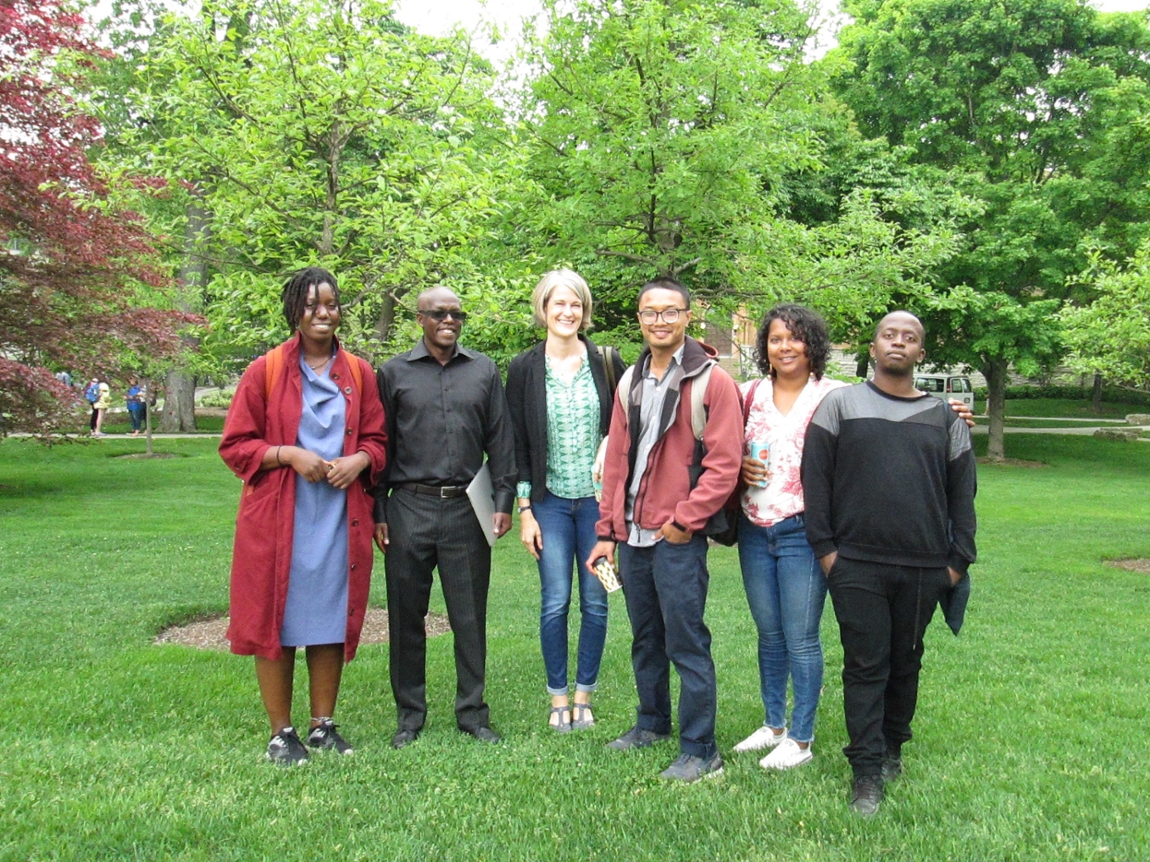
Dr. Steiner and Evan Mwangi after meeting with grad students. From left to right: Delali Kumavie, Dr. Mwangi, Dr. Steiner, Kritish Rajbhandari, Sureshi Jayawardene, and Mlondolozi Zondi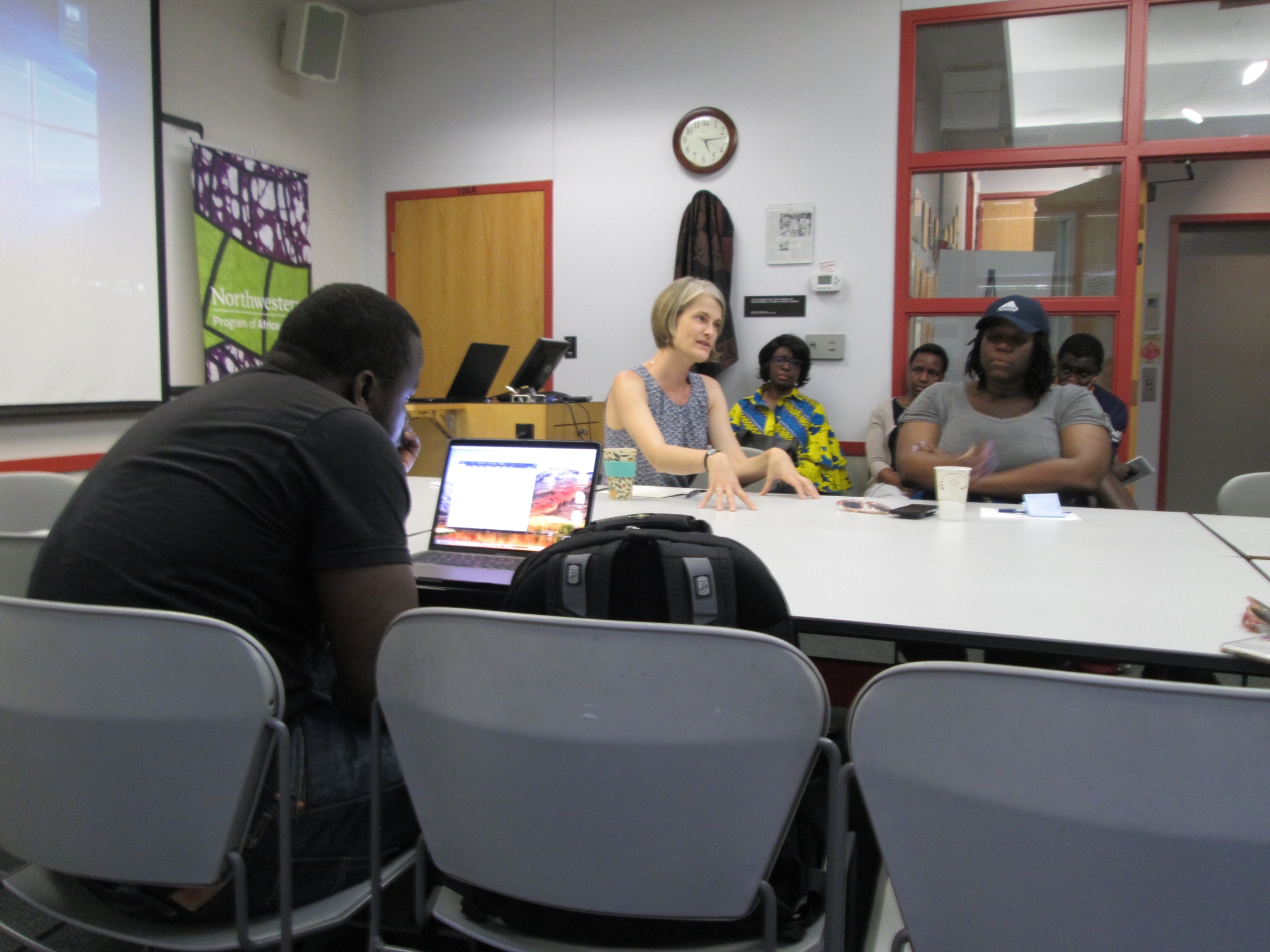
Dr. Steiner delivering her talk at the Program of African Studies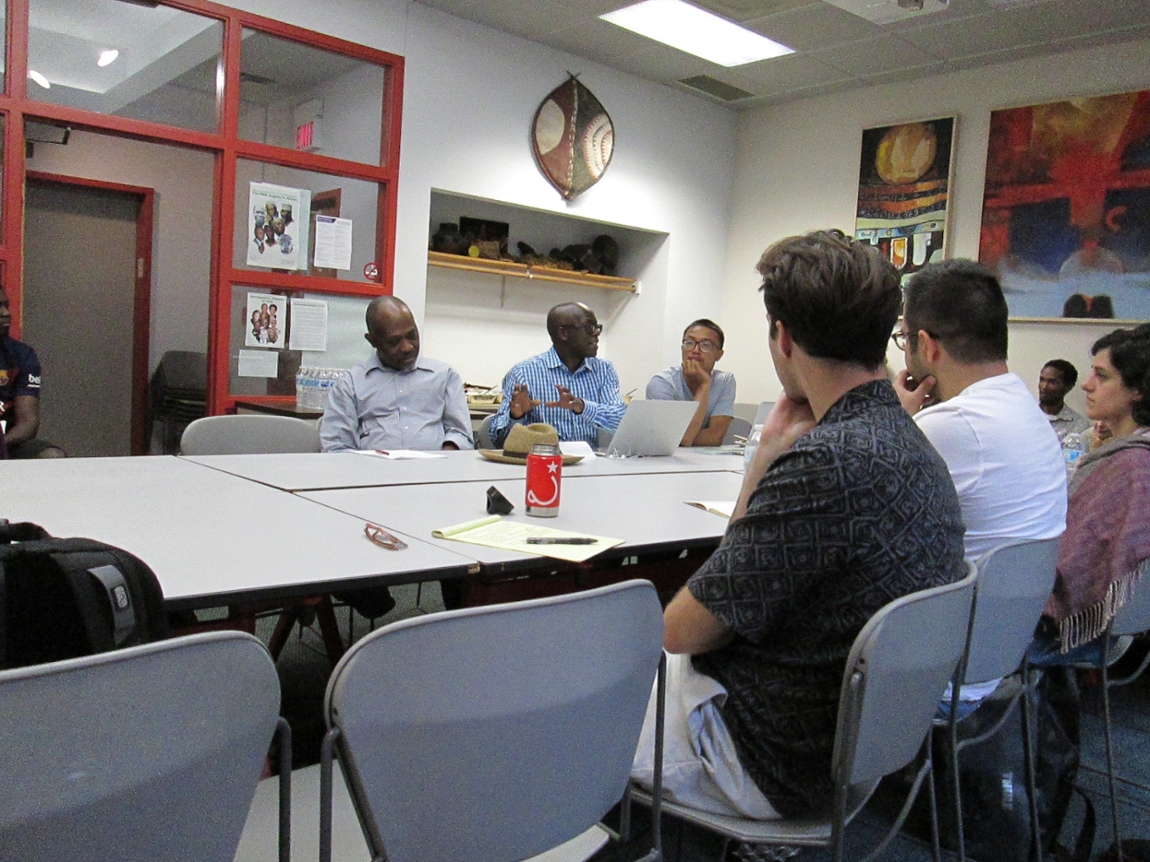
Dr. Mwangi responding to Dr. Steiner's talk - March 2018
Serah Kasembeli has completed her predoctoral fellowship at Northwestern and is now back at Stellenbosch University. During her stay she transcribed Jabavu's travelogue, built a list of Indian Ocean Epistemologies resources (linked above), convened a reading group on the subject of Indian Ocean Epistemologies, and delivered a presentation on her work, all the while continuing to progress on her dissertation. - January 31, 2018 | Northwestern
Serah Kasembeli delivered her paper "Barrenness and Desire in Therese Benadé's Kites of Good Fortune and Rayda Jacobs's The Slave Book" to the Northwestern Program of African Studies. The paper is a part of Serah's research on the silences of Indian Ocean Slavery.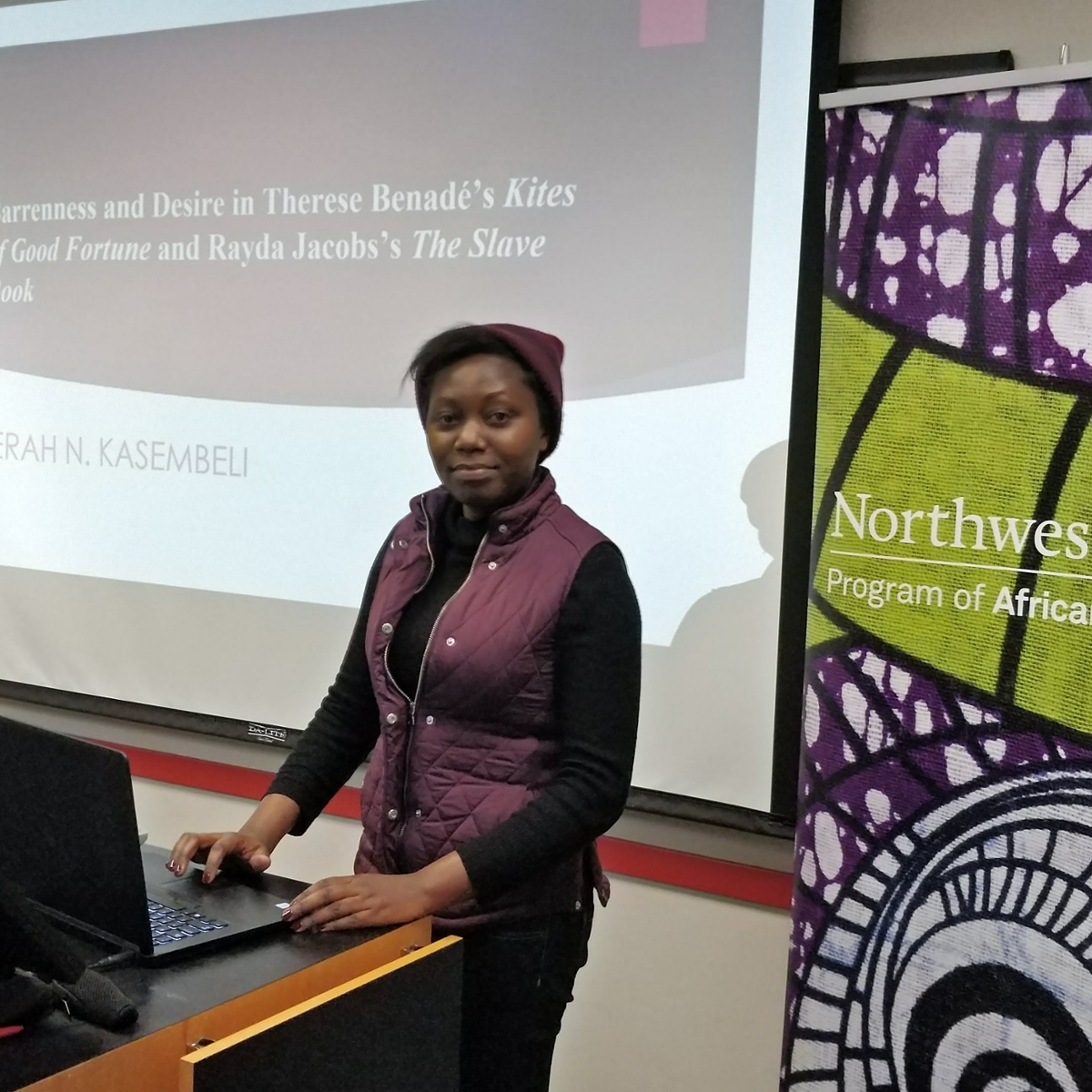
- January 2018
Now with the transcription complete, the editing process on Jabavu’s travelogue has begun and the team, consisting of Professor Steiner (Stellenbosch), Dr Jadezweni (Rhodes), Professor Higgs (British Columbia) and Professor Mwangi (Northwestern), is working to put together the various parts of the manuscript. Professor Steiner is in negotiations with the commissioning editors at Wits University Press, who have expressed interest in publishing the travelogue. - January 18, 2018 | Northwestern
Serah Kasembeli, together with Northwestern doctoral students, has convened a reading group on Indian Ocean Epistemologies. The call for participants is below:
Linking Southern and East Africa with the Arabian Peninsula, the Indian subcontinent, and South-east Asia, the Indian Ocean has a long history of circulation of people, objects, and ideas across changing geo-political frontiers. This reading group intends to introduce us to what it means to think Indian Ocean Epistemologies as a site of theorizing from the Global South. We will explore the ideas, histories, and processes of transnationalism and globalisation, with the intention to engage the silences of the Indian Ocean as a way to understand decolonisation in the Global South. How do we theorize transnationalism within the south itself? What of non-western sources of globalisation, or processes of transnationalism that happen without reference to Europe?
We invite you for our first reading group in the Winter Quarter to read:
Markus Vink, "Indian Ocean Studies and the 'New Thalassology'"
Gabeba Baderoon, "Introduction," Regarding Muslims: From Slavery to Post-Apartheid.
Nile Green, "Africa in Indian Ink: Urdu Articulations of Indian Settlement in East Africa"
Date: Thursday 1/18/2018
Time: 3-5pm
Venue: CLS seminar room (Kresge 5-531) - November 11–13, 2017 | Northwestern
Professor Mwangi and Serah Kasembeli participated in Transformations of Critical Theory, the inaugural workshop of the Critical Theory in the Global South Project. On November 13, Professor Mwangi, together with Professor Marisa Belausteguigoitia of Universidad Nacional Autonómia de México, chaired a teach-in for graduate students on the theme "The Transnational Routes of Gender: Global South Reading Strategies and Critique in Feminist Theory."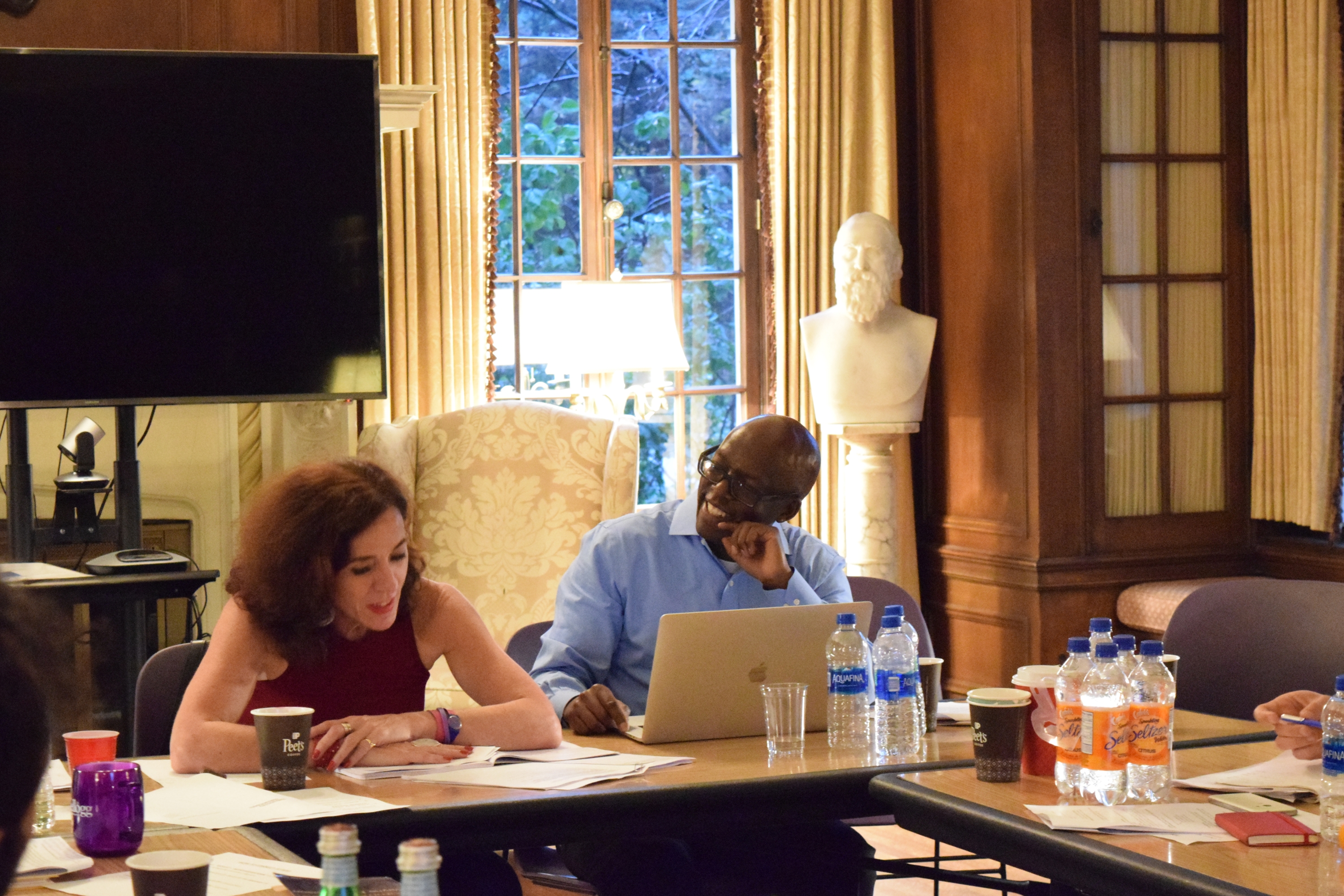
Evan Mwangi and Marisa Belausteguigoitia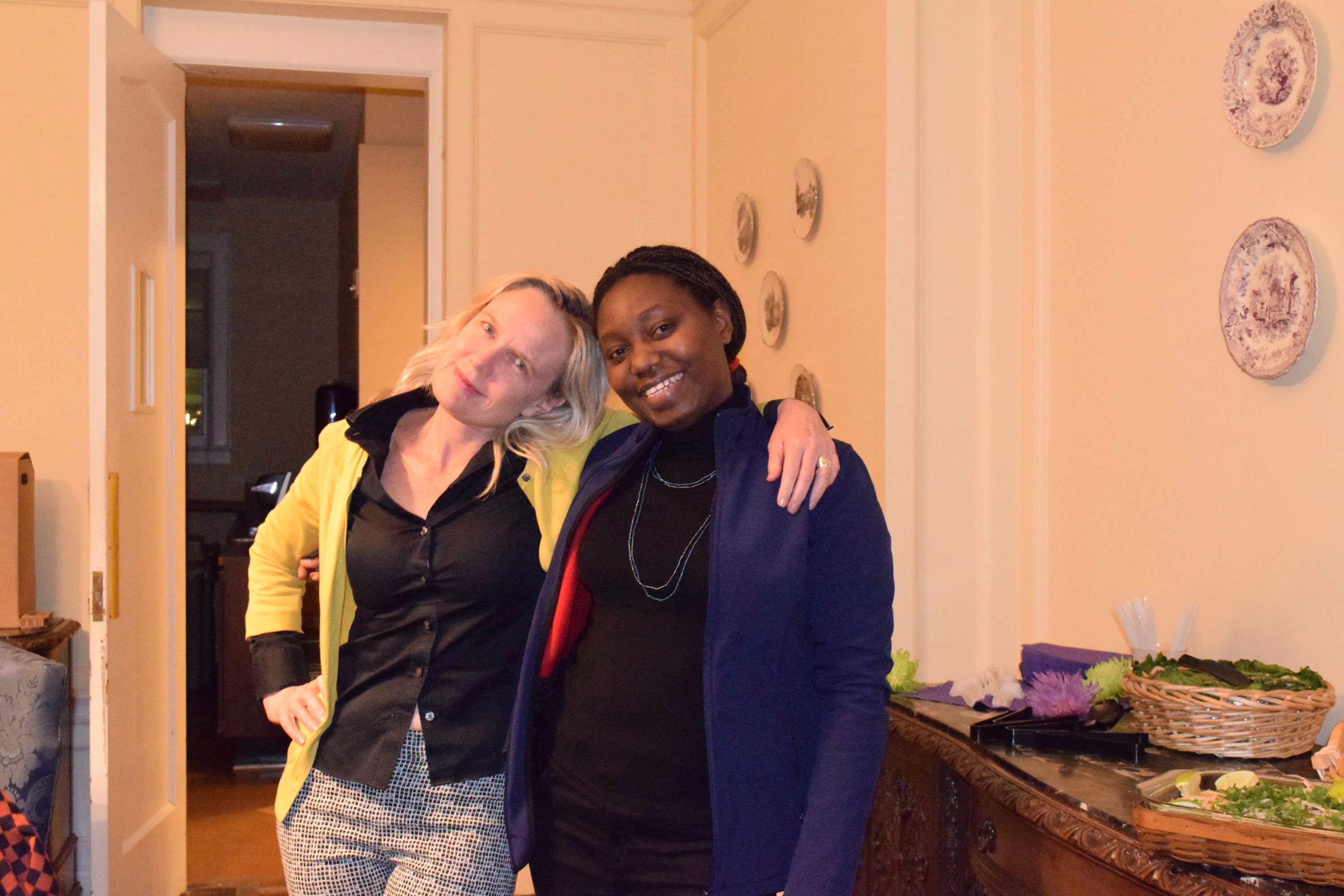
Sarah Nuttall and Serah Kasembeli - September 2017 | Northwestern
Serah Kasembeli is now in residence and copy editing the Jabavu travelogue as well as attending classes. Welcome, Serah! - July 2017
Eastern African Literary and Cultural Studies special issue on Indian Ocean Epistemologies call for papers: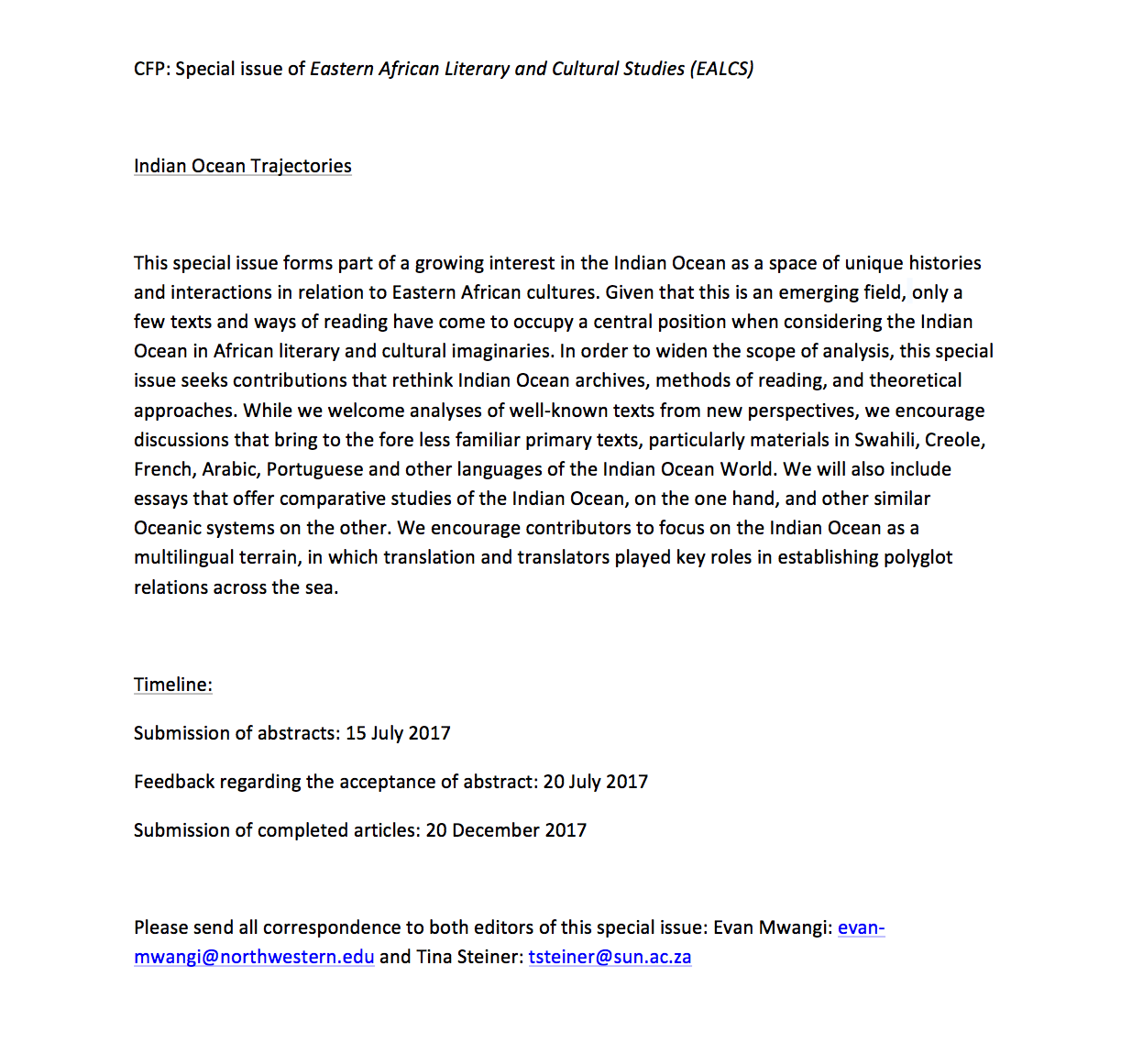
- March 15–24, 2017 | Stellenbosch, South Africa
Professor Mwangi visited Stellenbosch to initiate the Mellon collaboration with Professor Steiner